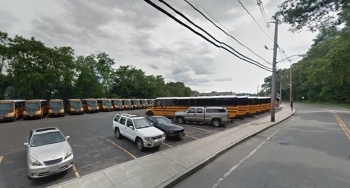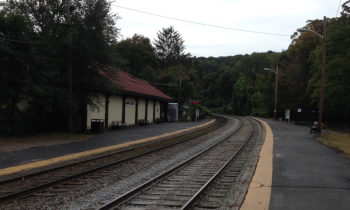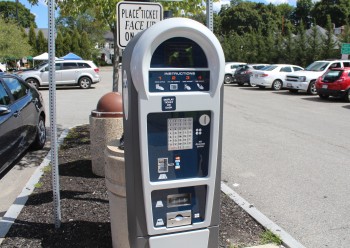Photo: Lydia Phippen Ogilby with Paul Roberts before the Belmont Board of Selectmen.
When the Belmont Board of Selectmen voted Monday night, Sept 28 unanimously, to approve the “enhancement” plan for the green delta in Belmont Center, a round of applause rang out throughout the crowded meeting room in Belmont Town Hall.
But hold on. Wasn’t the ever-changing blueprint for the redevelopment of the parcel abutting Belmont Savings Bank the catalyst for a four-month long, running battle that included the calling of a Special Town Meeting, competing citizen’s petition, condemnations, yelling and the need to have a police officer at one meeting to “keep the peace?”
The answer to those questions is “yes.” But through the efforts of two individuals, Belmont found a compromise design that meets the demands of protagonists from both ends of the issue.
“We actually ended up in a much better spot as a community. This is a really good answer whether you call it a compromise or an enhancement, it’s much nicer,” said Belmont Selectman Mark Paolillo.
While many residents can claim parentage of the new space – resident Bonnie Friedman and the director of the Office of Community Development Glenn Clancy were two named by others – two former selectmen were praised for bridging the gap between those mostly senior citizens who sought to reintroduce parking and a pass through roadway in front of the bank and those who fought for the parcel to become a new “town green” with the space abutting the bank.
(A history of the dispute and the Special Town Meeting can be found here.)
Rojas’ blueprint for the 17-foot wide pass through incorporated the dual requirements of parking while creating a “pedestrian friendly space” using the same brick and concrete being used throughout the Belmont Center Reconstruction Project.
When the roadway is closed off at the intersection of Moore Street during non-peak hours – the Selectmen agreed to hold public discussions on the best times when to shut down the avenue – the area becomes a pedestrian-friendly area.
“It really looks like a plaza,” said Rojas, noting the green space is larger than in either of the previous two plans.
While Rojas created the plan, Ralph Jones played the role of diplomat, bringing the different sides together both after the Special Town Meeting while urging the Selectmen – which had final say on the design – to take a last stab at finding a middle ground.
“[Jones] is able to move between the Selectmen and the residents and begin the compromise,” said Friedman last month when ideas were being passed between the opposing camps.
Some areas of the design – such as extending the crosswalk along Moore Street to enhance pedestrian safety – will be reviewed, the bulk of the construction work will be completed before the end of the construction season in the next two months.
For Lydia Phippen Ogilby, the long-time Washington Street resident whose petition began the series of events in May, said the actions of the past five months “has stirred up this community which as been asleep for a long time.”











